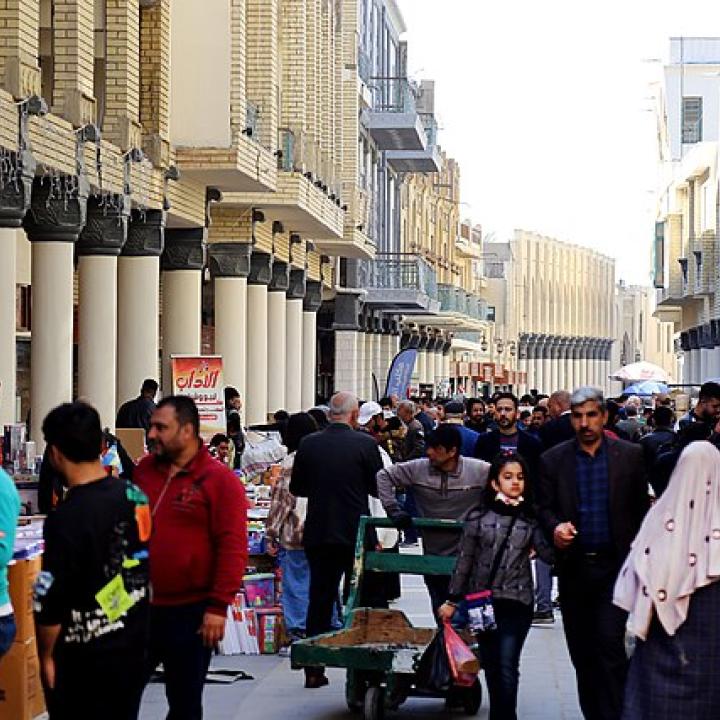
- Policy Analysis
- Fikra Forum
The Case of Iraq Underscores the Need for an International Anti-Corruption Court

Given the inability—or unwillingness—of Iraqi institutions to adequately combat corruption, the need for an international entity to step in becomes evident. That is why supporting the global campaign for the creation of an International Anti-Corruption Court (IACC) is necessary in order to hold kleptocrats accountable when national court fails to do so.
Since the U.S. invasion of Iraq and the subsequent installation of its first democratically elected government, corruption has been an endemic problem for the Iraqi government. Year after year, billions of dollars from public funds either disappear or are illicitly funneled out of the country. An estimated $350 billion has been siphoned from the Iraqi state by corruption, with a substantial portion reinvested abroad, ostensibly only to support the culprits. This vicious cycle must be halted.
Despite Iraq's abundance of natural resources and the influx of billions in oil revenue over the past two decades, the situation in Iraq is dire: the service sector remains insufficient, and the public healthcare system is inadequate. Unemployment is rampant, and according to statistics from the Iraqi Ministry of Planning, a staggering 25% of the population lives below the poverty line. In addition, Iraq has grappled with political instability over the past two decades, marked by sectarian conflict and shocking acts of terror, both exacerbated by corruption. Political parties and sectarian groups vie for a share of the pie, with the general population receiving no benefits.
The pervasive corruption within the Iraqi government affects the way outside actors must interact with the state. Some international companies resort to bribery to secure substantial contracts, resulting in these illicit funds enriching interest groups indirectly linked to various ministries. These ministries are often led by ministers politically appointed by sectarian groups, contributing to delays and failures in infrastructure projects. Large contracts primarily benefit companies associated with political parties or specific politicians, operating with impunity. This puts international companies, including those from the United States, at a disadvantage when it comes with complying with anti-corruption measures, while trying to compete for contracts and doing business in Iraq.
For years now, wrongdoers have been able to evade prosecution due to loopholes in the current legal system. While Iraq does have stringent laws against corrupt individuals and publicly exposed politicians, there is no effective mechanism in place to enforce these laws. The Commission of Integrity (CoI) and the Ministry of Justice (MoJ) of Iraq have limited international prosecutorial power, and even if wrongdoers are caught, they cannot be pursued beyond their jurisdiction or cooperate with other jurisdictions to freeze and repatriate stolen funds. Furthermore, red tape and accounting procedures make it hard for the CoI to convince the Ministry of Finance to appropriate funds for their legal activities outside of Iraq. The bureaucracy surrounding financial allocations often leads to delays and obstacles that hinder the CoI's ability to carry out essential tasks in foreign jurisdictions.
Despite the CoI's crucial role in investigating corruption and promoting accountability, the intricate web of regulations and paperwork denies the commission the resources necessary to follow leads, engage with international law bodies, or prosecute offenders. Even after its three-year budget was tripled, Iraq’s Ministry of Finance neglected to set aside any money for the CoI to increase its prosecution capabilities. The detrimental effects of corruption are well-known, but Iraq’s officials have showed little interest in combating it. Nor are there incentives for politicians in power to empower the CoI, fearing that an emboldened justice system could be weaponized against them by their opponents in the future.
While some politicians have attempted to reverse this trend and strengthen both the CoI and the MoJ by introducing new laws, these efforts have consistently faltered upon reaching the parliamentary floor. During the previous administration, Iraqi President Barham Saleh convened a committee comprising several judges and academics, of which I was a member, to draft legislation aimed at empowering the CoI and closing the legal loopholes that allow wrongdoers to exploit the justice system. These proposed measures included supporting the Attorney General of Iraq and providing incentives for whistleblowers to expose corruption. The existing law (article 14th of law no.9 of year 2012) provides little reward for whistleblowers compared to the risks involved. This legislation aimed to facilitate the freezing and return of stolen funds, with all profits generated from these funds intended for the benefit of the Iraqi people. Unfortunately, like other anti-corruption laws, it never made it to the parliamentary floor for discussion or a vote.
Given the inability—or unwillingness—of Iraqi institutions to adequately combat corruption, the need for an international entity to step in becomes evident. That is why supporting the global campaign for the creation of an International Anti-Corruption Court (IACC) is necessary in order to hold kleptocrats accountable when national court fails to do so. The NGO Integrity Initiatives International (III) —led by Judge Mark Wolf of the United States, Justice Richard Goldstone of South Africa, and others—has, with its many partners, begun to have success in attracting public support for the IACC from the governments of Canada, Colombia, Ecuador, Moldova, the Netherlands, and Nigeria, as well as the European Parliament. III is now organizing an expert group to produce a model treaty for the creation of the IACC.
Sadly, corruption in Iraq remains the primary trigger for conflicts, sectarian divisions, and governmental dysfunction. The deep-rooted corruption in the Iraqi government cripples the state’s capabilities and contributes to poverty, climate change, mass migration, and violence. In lieu of a domestic solution, it is imperative that an international court be permitted to prosecute those corrupt individuals who, through their actions, imperil the future or everyday civilians.
